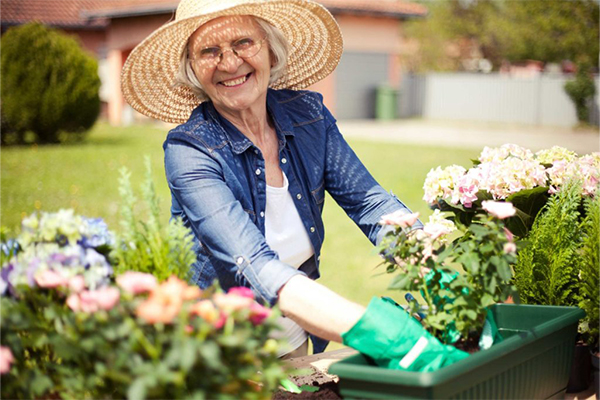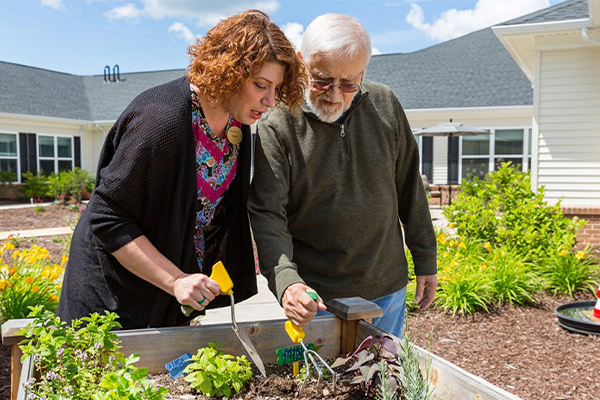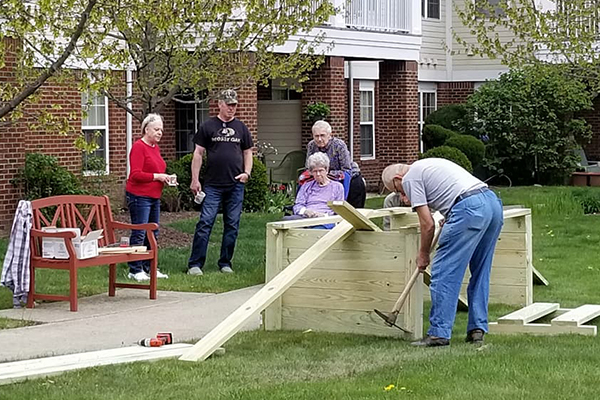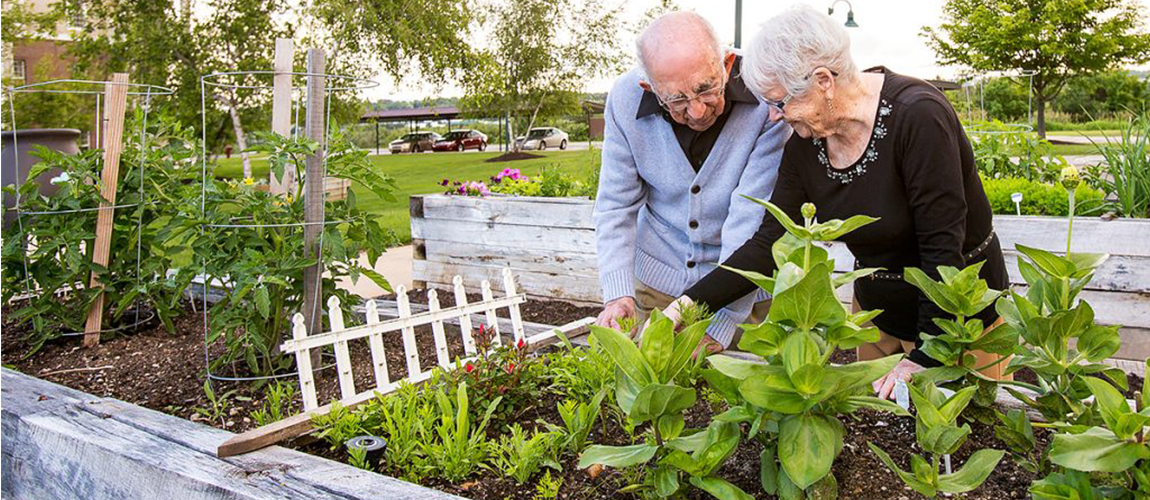Interested in gardening, but don’t know where to begin? Plant a few seeds, we promise this new hobby will grow on you! There are real benefits to gardening for seniors that we will explain throughout this blog. But, we understand that gardening can be hard work. If you’re ready to take the challenge, we wrote the complete guide on gardening help for seniors.
Use our guide below for insight on how to start your own garden, the best tools to use and the top benefits of gardening. With a bit of planning and a few helpful tips, you’ll be able to enjoy the fruits of your labor in no time.
4 Steps To Starting A Garden For Seniors
Want to start a garden, but not sure where to begin? Where you decide to plant your garden is critical. To ensure you have the right location for your garden, follow these steps:
- Consider the amount of sunlight. Plants need proper sun exposure in order to grow. This can be easier outdoors but be aware of shadows caused by covered areas such as balconies, patios or window sills. If you’re thinking about gardening indoors, keep your plants near a window to ensure that your garden is getting the right amount of vitamin D for the best results.
- Make sure the spot is accessible. Garden accessibility starts with paths. Accessible paths allow for increased mobility and safety of movement throughout the garden. Creating a pathway to your garden will ease access for canes, walkers and wheelchairs. To avoid any unnecessary stress on your body, your garden should be in a spot where you are comfortable accessing it quickly and easily. Accessible gardening makes gardening easier and more enjoyable for anyone, regardless of limitations.
- Choose the best type of garden for you. When considering where to put your garden, it’s helpful to know what type of garden you envision. Do you want flat beds on the ground, tiered planters, pots, raised planters, hanging plants or any other style of planter? Raised beds two to three feet in height allows for easier maintenance and can be a great option for seniors looking to avoid too much kneeling down or bending over.
- Pick what type of plants to grow. Would you be happier with a vegetable garden or a flower garden? When creating an outdoor garden or a flower pot garden, some plants are easier to grow for beginners who are seniors.
Plants like lettuce, green beans and tomatoes are the easiest vegetables to grow. For flowers, sunflowers, zinnias and marigolds are among the easiest to grow. Indoor gardeners, use our indoor gardening starter guide to help you choose the best plant to start!
Once these bases are covered, your garden should be set up for success. Whether it’s indoor or outdoor, the proper care and attention is what will make your garden thrive.
Gardening Help For Seniors: The Best Tools To Use

Gardening is a fun and healthy way to spruce up the beauty of your indoor and outdoor spaces. Sometimes, though, gardening can be a lot of work. Using the right tools can make gardening more enjoyable. While there are plenty of specific products to choose from, we’ve listed some thoughtful tips to help make gardening easier!
Some tools that can provide gardening help for seniors are:
- Bright colored tools. When purchasing a shovel, sheers, watering can or other tools, choose bright colors so that finding your tools is easy. Don’t buy green tools, they’ll blend in with the grass!
- Foam grips or ergonomic tools. Adding foam grips to gardening tools can be helpful for seniors experiencing arthritis.The key features to look for in arthritis-friendly gardening tools include ergonomic design and good grips.
- Stools. Keep a stool near your garden to prepare for breaks. Don’t overwork yourself.
- Tool caddy. House all your tools and gardening supplies in a caddy to avoid making multiple trips. Caddy options come in the form of a tote bag, on wheels or a basket to attach to your wheelchair.
The Top Benefits Of Gardening For Seniors
Gardening is a great excuse to be outside and get your hands dirty. Create a fun journey for yourself as you watch the seedlings go from flowers to produce. Here are some of the most prominent benefits of gardening for seniors:
A Fun Way to Stay Active
Getting out and tending to your garden keeps your body moving, which is a fun and simple way to stay active. According to the CDC, Adults aged 65 and older need at least 150 minutes of moderately intense physical activity a week, (or about 30 minutes a day, 5 days a week.) Mowing the lawn, raking leaves and gardening are great outdoor tasks that can help meet requirements for moderate physical activity.
Nutritional Benefits of Growing Your Own Food
Nothing beats garden-fresh vegetables. The best part of growing your own food? Anything you plant will double as a nutritious snack — which can save you a trip to the grocery store. Try to start simple. Some fruits and vegetables are more common to grow than others.
Benefits Of Gardening In A Community Garden Or Senior Living Community

If you can’t have a proper setup at home, seek out a community garden. Many local areas have community gardens or gardening activities. If you live in a senior living community, they might offer one as well.
Community Gardening Has Social Benefits
Making new friends and enjoying a common interest can surely make every day brighter. Gardening groups offer a way for people to connect with nature and each other, making it a great way to socialize. Connecting with other members of a gardening group allows people to receive social support and contributes positively to the lives of others.
Community Gardening Creates An Attractive Landscape
A well-designed landscape creates an attractive environment. Features such as planted trellises and trees create a shady, relaxing respite for the area’s residents. Trellises can also be planted with ornamentals like flowering vines or with edible crops like tomatoes, beans or grapes.
Gardening in a community is a fun group activity that has the added bonus of sprucing up the area around you for you and your neighbors. Your neighbors will thank you!
A Community Garden In Action At Independence Village, Aurora.

At many StoryPoint Group communities, we have community gardens and resident-led gardening clubs. Collaborative gardens are a great way to get to know your neighbors while bonding over a common past time.
The community garden, lovingly named the “Nature Nook,” at Independence Village of Aurora (shown above) is grown and nurtured by residents. It was a community effort to build, and today it features all sorts of unique and exotic flowers, trees and plants.
Grow At A StoryPoint Group Community
If you or a loved one are considering moving to a senior living community, explore the many benefits of senior living at a StoryPoint Group community. With maintenance-free living, you can spend your extra time tending your garden and meeting new friends. Our communities have a wide array of amenities, including community gardening at many of our locations. To get started, call 1-844-275-9990 or find a community near you so you can grow with us.











